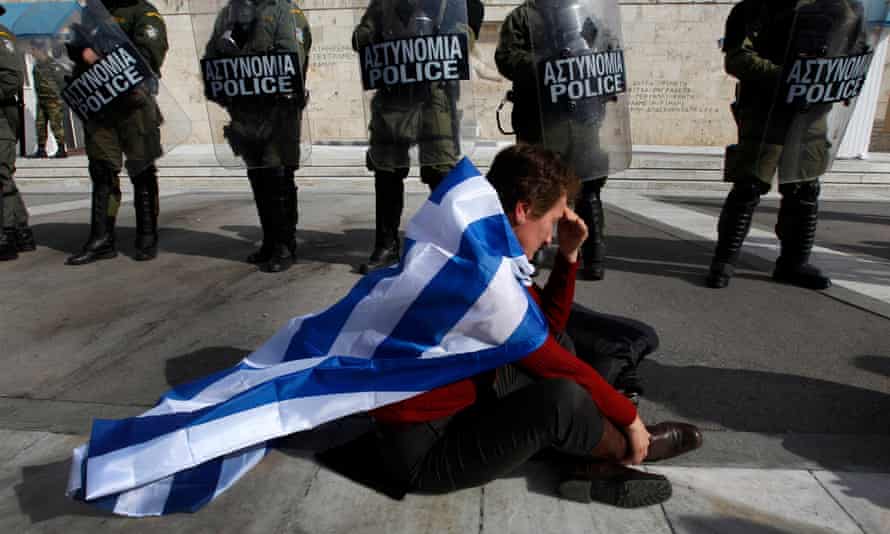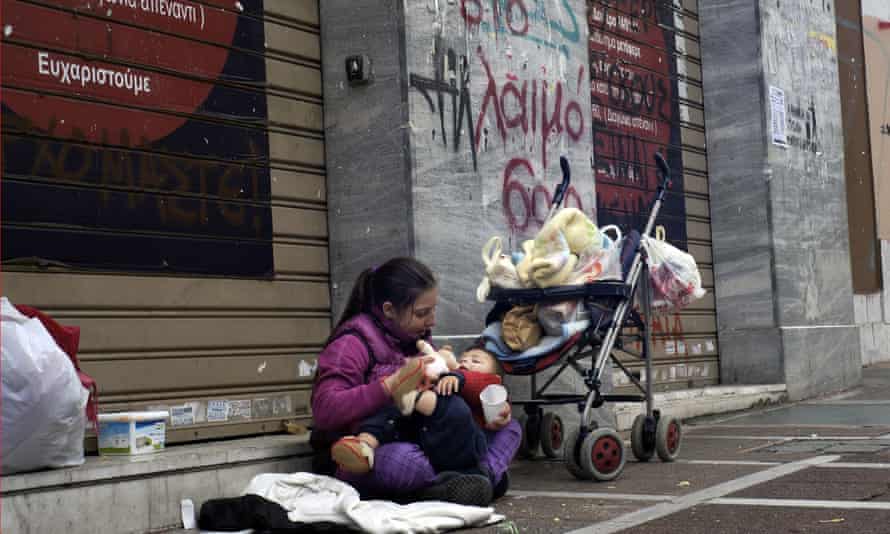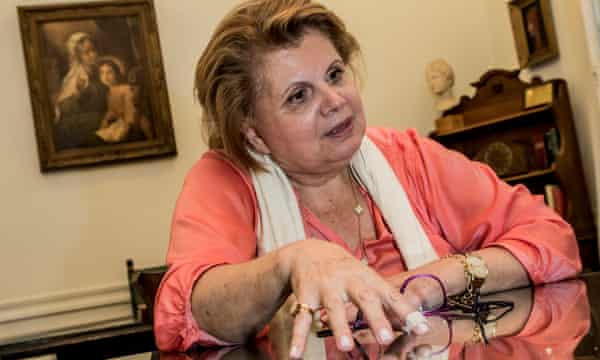what can greece do to recover from financial crisis
1000 reece'southward oldest literary gild, the Parnassos cultural lodge, stands contrary a church on one of Athens's oldest squares. Its neoclassical facade and monumental columns were designed to print. The club, named after the abode of the Muses, had a single objective: to promote the nation'southward "intellectual, moral and social improvement" as Greeks, newly freed from the shackles of Ottoman rule, sought to pursue the course of other European states.
It was hither that poets and writers came, that Maria Callas first sang, that every creative person of every hue showtime exhibited, and royals and prime number ministers flocked. It is also why Parnassos's fortunes have reflected those of Hellenic republic.
"These crisis years have been difficult years," says Leonidas Georgopoulos, the sprightly septuagenarian who sits on the society'southward lath of directors. "You lot could say information technology has been an era of decadence. But decadence is always followed by renaissance and that is what we are hoping for now."
Greece is approaching the stop of an odyssey. After 8 drama-filled years, it is now barely half dozen weeks until the debt-burdened land exits its third and final international bailout plan. Renaissance, rebirth, recovery are mots du jour as the historic date nears. And relief is etched on the faces of officials in Brussels.
"Hellenic republic is about to stand up on its own ii feet again," the European Matrimony'southward economical chief, Pierre Moscovici, enthused terminal week. Freed from the shackles of international supervision, information technology could regain its identify every bit a "normal country in the eurozone".
Later on looking over the completeness, coming perilously shut to crashing out of the euro, seeing their national income slashed by austerity-driven recession, their unemployment charge per unit skyrocket, their brightest and all-time leave, Greeks had come through the worst. The ordeal by defalcation was over. The EU had stood past its partner – whose links with ancient Greece played an indisputable role in Athens's admission in 1981 as a fellow member of what was the European Economic Community – and economic Armageddon had been averted.
Simply was Moscovici right?
In the Greek parliament's members' common room, the MP Harry Theocharis ponders the new state of affairs. Denouement has come up with a whimper. Under the crystal chandeliers and portrait-heavy walls of the meeting room, there is fiddling sign of jubilation. In the building whose cliffhanger votes punctuated the crisis, is at that place really zippo to celebrate?
"Of course there is relief but information technology is non enough for people to get excited," says the deputy who headed the Greek finance ministry's public acquirement department at the height of the crisis and at present sits in the 300-member firm as an independent. "Economically speaking we are still sputtering and there is still a lot to be washed. Our creditors are not going away. In January another round of cuts worth €1.8bn will be implemented. And nosotros're talking nigh fiscal targets in 2060. I'll be 90 past then."
But Theocharis shares the conviction of Alexis Tsipras, Hellenic republic'southward leftwing prime minister, that the country will win back a degree of political and fiscal independence. Psychologically that is not insignificant iii years earlier Hellenic republic marks the 200th ceremony of the start of the state of war of independence from the Ottoman empire.
"We can approach it knowing we volition have regained a sense of command over our destiny," he smiles. "Frankly, it'southward amazing that with a 25% loss of GDP we didn't lose democracy also. Perhaps it's our symbolic zipper, existence the birthplace of democracy and all that, simply every day I marvel that nosotros managed to proceed our faith in it."

In global financial history no state has received as much money as Greece. Since May 2010, when it became clear that three decades of economic mismanagement had brought the state to its knees – creating a deficit quadruple the size of that allowed by Brussels – the EU and Imf take sought to avoid bankruptcy past committing more than than €300bn in loans to Athens. The country has taken stock of €260bn, although most of that money has instantly gone back to creditors in the form of debt repayments.
Rescue has come at a price. The weather condition attached to such assist take been tough, unpopular and, at times, punitively ambitious. Pay and pension cuts, tax rises and structural reforms, many securely disliked if long overdue, have been at the root of creditors' relentless demands. But the fiscal straitjacket has also stifled economic growth. From 120% of Gdp at the offset of the crisis, the ratio of debt-to-economic output now hovers around 180%, past far the highest in the European union.
"The state was broke in 2010, but the creditors pretended information technology was a cashflow problem, when really Greece needed a restructuring of its debt early on," says Professor Loukas Tsoukalis, who presides over the Hellenic Foundation for European and Foreign Policy, Eliamep. "Internationally that wasn't feasible because everyone was so agape of the consequences it would have for French and High german banks."
In his seventh-flooring office, the airconditioners whirring, he momentarily pauses. "You don't have to be a revolutionary to acknowledge that, initially, the economic adjustment programmes fabricated excessive demands. OK, much of Greece'south political grade was in a state of denial. Only the event was the implosion of the Greek economic system."
Still, the academic who previously advised presidents of the European commission and European quango, is like Theocharis, incredulous that republic has fared as well as it has. "If you had told me that Greece would lose a quarter of its GDP, that unemployment would reach 27%, and that democracy would survive, I would not accept believed it."
Thugs may have appeared in the form of the far-correct Golden Dawn, polarisation may have worsened and discourse coarsened, only institutions remained intact. "Given what has happened, that is remarkable. The bad news is that the price nosotros have paid is huge. Socially, Greece is an injured gild, information technology is traumatised and it is humiliated."
Parnassos, in some ways, stands equally the perfect metaphor for gild's full-frontal collapse. On the surface information technology nonetheless has a patina of acceptability – the decor that about have come to expect of Greece. For the Eu, dealing increasingly with the twin ills of nationalism and populism and dandy to put Greek drama behind it, that is more valuable than words.
But radical downsizing has also had a corrosive effect. On its shoestring budget, the gild's staff has been cut to two guards, ii concierges, two cleaners and 2 accountants. Every month the society struggles to pay its bills, by and large considering of the onerous chore of having to keep upwardly with taxes. Lack of funds has meant the order'due south 75,000-strong collection of books – one of the finest in Greece – has begun to suffer. In the building'south basement, tomes spill from bulging wooden shelves, their spindly 18th- and 19th-century spines destroyed by the dust, clammy and droppings from ceilings that have partially collapsed.
At 78, Georgopoulos belongs to a generation brought up on loss, starting with the Asia Small catastrophe that followed Greece's disastrous military campaign against the Ottoman Turks. The rout in 1922 led to the loss of territory formerly ceded to Greece and a major exchange of ethnic Greek and Turkish populations.
In his own life, he has witnessed brutal German occupation, the bloody civil war that came on its heels, and seven years of armed forces dictatorship before the return to democracy in 1974. The latest crunch comes high on his list of national defeats, merely despite information technology all, he remains irrepressibly optimistic. "God must dear this state," he says whimsically. "We take suffered so many defeats, lost and so many wars. Virtually nations would have disappeared."
Georgopoulos need non have exerted his efforts on saving Parnassos. Equally co-founder of the largest law firm in Athens, he could exist enjoying carefree retirement. Simply he belongs to the great ring of Greeks who have rallied during the crisis and proved that the good requite. The vast network which has emerged, in an outpouring of solidarity both for fellow Greeks and refugees arriving in rickety boats from Turkey, have been the gum that has helped go along lodge together.
Levels of farthermost poverty shot upwardly from 8.9% in 2011 to 15% in 2015, according to the Athens-based thinktank Dianeosis. I in 40 of those affected are pensioners, long thought to be worst striking by cuts. Only the thinktank has also calculated that i in four are young Greeks, aged xviii to 29 – people who are among the one thousand thousand who have lost jobs, or from the start take never been able to find ane.

Many believe it will take a decade, at least, before the nation claws back lost income and returns to pre-crisis living standards. Worsening demographics have not helped: after Bulgaria, Hellenic republic has the everyman fertility charge per unit in the EU, with the population dwindling past almost three% every bit a upshot of emigration and fewer births during the crunch.
"So many take learned to be poor, then many accept been excluded from hope," says the leading sociologist Konstantinos Tsoukalas, adding that with no dictionary to draw progress reversed, progress equally a concept may as be denuded of meaning. "Yeah, we take survived as part of the EU just God knows what this survival volition amount to. If Greece had left the European system, and information technology was impact and go, I incertitude with its limited productive capacity and the existential crisis and violence that would have erupted, it could even accept stabilised the situation."
Stabilisation has resulted in a fall of around 20% in unemployment. Promise also appears to be on the rise. In the eye of a record tourist flavor, the Hellenic Entrepreneurs Clan announced last week that enquiry showed optimism had grown by 20%.
"I propose that we brand this new optimism the driver of growth. That we turn it into creativity and productivity," said Vassilis Apostolopoulos, the association's president, as he opened its annual forum.
But while Hellenic republic was approaching the finish of an era, the man of affairs also cautioned that the economic system remained weak. Without dynamic growth that is inclusive, private-led, outward-looking and adventure-taking, recovery could be elusive. "We have to realise that this is the beginning of a critical new era," he said, insisting that the decision of the country'south third rescue programme would amount only to the "symbolic closure" of the wheel of bailouts to which Athens had been subjected.
As of 21 Baronial, Hellenic republic would have to "proceed the necessary corrective reforms to unlock the economy's productivity, strengthen its competitiveness and reinvigorate entrepreneurship".
Nobody believes the land can successfully pay back its debt. A deal, unveiled last month, giving Athens the ability to extend payments on its accumulated €320bn debt pile by a decade, has provided much-needed breathing space to modernise the economy but is widely seen as inadequate if Hellenic republic is to avoid further crisis down the line.
Tsipras, once fervently anti-austerity just now an economical pragmatist to a degree that has surprised many, appears willing to stay the class – fifty-fifty if polls evidence his Syriza party lagging far behind the main opposition, centre-correct New Commonwealth.
"But," says Stergios Pitsiorlas, the deputy finance minister, adjusting his spectacles, "information technology will require a big change of mentality hither, one that accepts nosotros can no longer alive across our ways – that surpluses, not deficits, are the way forward."
In this post-Trumpian earth of political strongmen and global unpredictability, Tsoukalas now fears for Europe more than Greece. The professor belongs to the tradition of leftwing intellectuals who fervently believe in the innate forcefulness of Europe existence united.
"If Europe doesn't explode, Greece volition be able to survive, and that volition exist a good thing considering if we weren't in Europe, this country would be much more similar the Middle East in terms of fanaticism, violence and poverty," he says. "But I fear the precariousness. If these tendencies grow, if Europe's cohesion goes on being challenged, Grexit volition be back on the table."
Stories from a decade of austerity
Ioanna Iliadi, 62, president of the Athens Hospice for Neuro-disability

"Nobody believed the crisis would last so long. At the hospice we look after society's nigh vulnerable, the weakest of the weak, those with incurable illnesses and nobody to care for them. But we've been hit sideways. From 2012, when I took over, nosotros've been forced to reduce the patient intake, cutting staff and shut down one of our hospital wings at a time when waiting lists are only growing.
"As a individual philanthropic foundation we survive on donations, particularly properties left to us by relatives of our patients. The taxes we've had to pay since the [bailout] programmes began have been prohibitive. Meanwhile, our rents accept dropped by more than than one-half because nobody can afford them, and our donations from private individuals are down by 66%.
"This is the reality of Greece under international memorandum. Every day is a struggle, with most spent running after food and medical supplies."
Dionysis Ammolochitis , 41, president and master executive, Manifest Facility Management

"The crunch is something that happened to Hellenic republic – it didn't happen to me. I gear up Manifest in 2003 afterwards working as a salesman in some other company simply it's but in recent years that our turnover has soared. When others were on their knees, getting scared and pulling out, nosotros moved in and filled the gap.
"In 2009, at the start of the crunch, we had fewer than 50 companies on our books. At present we have 150, mostly multinationals, similar Coca-Cola, and 600 employees. We've got individual equity funding. To go information technology we had to undergo intense due diligence.
"My motto has always been 'call back big', continue, look direct ahead, but like a German. I've had a lot of business coaching and I've always been a fleck daring. Just the secret has besides been positive thinking. Whenever the news was dour I'd tell the team, 'In that location is no crisis, don't turn on your TVs, don't worry. I built this and, if need be, I'll practice it once more.'"
Elina Zeppou, 30, part-time trip the light fantastic instructor

"For a third of my life, Greece has been in crunch. I should have got used to it merely my parents died early and I've had no economic back up. Before information technology began, I had my ain car and rented a flat and was waitressing 6 nights a week.
"Suddenly, in 2010, that stopped because everyone panicked and my shifts were cutting. I had to get out my flat. With cipher to lose, I moved to London. I took upwardly dance again just it was the yr that the UK tripled tuition fees, so I couldn't beget to stay. I decided to return to Greece and enrol on a grade here only information technology cost €350 a month, which meant doing bar piece of work at night and getting up at 8am to nourish class. I still do both just now I teach office fourth dimension also.
"I wonder how long I'll be able to keep up at this stride. If, say, I have to get to the dentist or something crops up, I'm immediately over-budget.
"Once, on the metro, I was caught without a ticket and had to say, 'Await, I've literally got €ii in my pocket.'"
Source: https://www.theguardian.com/world/2018/jul/15/greece-exit-final-international-bailout-debt-catastrophe
0 Response to "what can greece do to recover from financial crisis"
Post a Comment